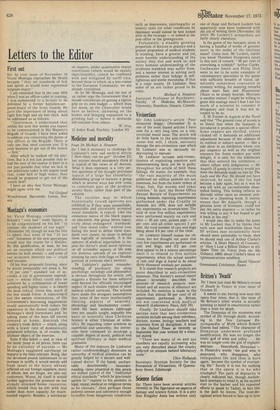Science fiction
Sir: There have been several articles recently in The Spectator on aspects of fantasy and science fiction. It is a pity that Kingsley Amis has written only one of these and Richard Luckett has apparently now been lumbered with the job of writing them (November 10) since Mr Luckett'S sympathies are fairly clearly elsewhere.
Is the genre of the fantastic alone in having a handful of works of genuine merit in the midst of the limitless inane? Come now, Mr Luckett, surely you know Theodore Sturgeon's retort to this sort of remark: "99 per cent of everything is rubbish?" Arthur Clarke, Cordwainer Smith and Philip Dick seem to me to be some examples of contemporary specialists in the genre with sufficient breadth of vision, admittedly sometimes concealed in crummy•writing, for sneering remarks about mars bars and Housewives' Choice to be simply boorish. Meccano is another matter; I might be willing to grant this analogy since I fear I am too much of a scientist to consider it derogatory and trust it was not intended to be so.
E. M. Forster in Aspects of the Novel said that "The general tone of novels is so 'literal that when the fantastic is introduced it produces a special effect: Some readers are thrilled, others ■ choked off: it demands an additional adjustment because of the oddness of its method or subject matter — like a side show in an exhibition where you pay sixpence as well as the original entrance fee. Some readers pay with delight, it is only for the sideshows that they entered the exhibition — others refuse with indignation — Mr Asquith (if gossip is correct) would pot meet the demands made on him by The Lady and the Fox. He should not have objected, he said, if the fox had become a lady again, but as it was he was left with an uncomfortable dissatisfied feeling. This feeling reflects no discredit either upon an eminent politician or a charming book. It merely means that Mr Asquith, though a genuine lover of literature, could not pay the extra sixpence — or rather he was willing to pay it but hoped to get it back in the end."
I would also like to make the point to Mr Luckett that if he thinks that such new and worthwhile ideas that SF writers may occasionally have should seem patentable to them, then he should read one of Arthur Clarke's articles, 'A Short History of Comsats,' or 'How I Lost a Billion Dollars in my Spare Time (in Voices from the Sky , Gollancz 1966) about Clarke's ideas on cpmmunications satellites.
David Vincent Greenstead, Colchester, Essex


































 Previous page
Previous page